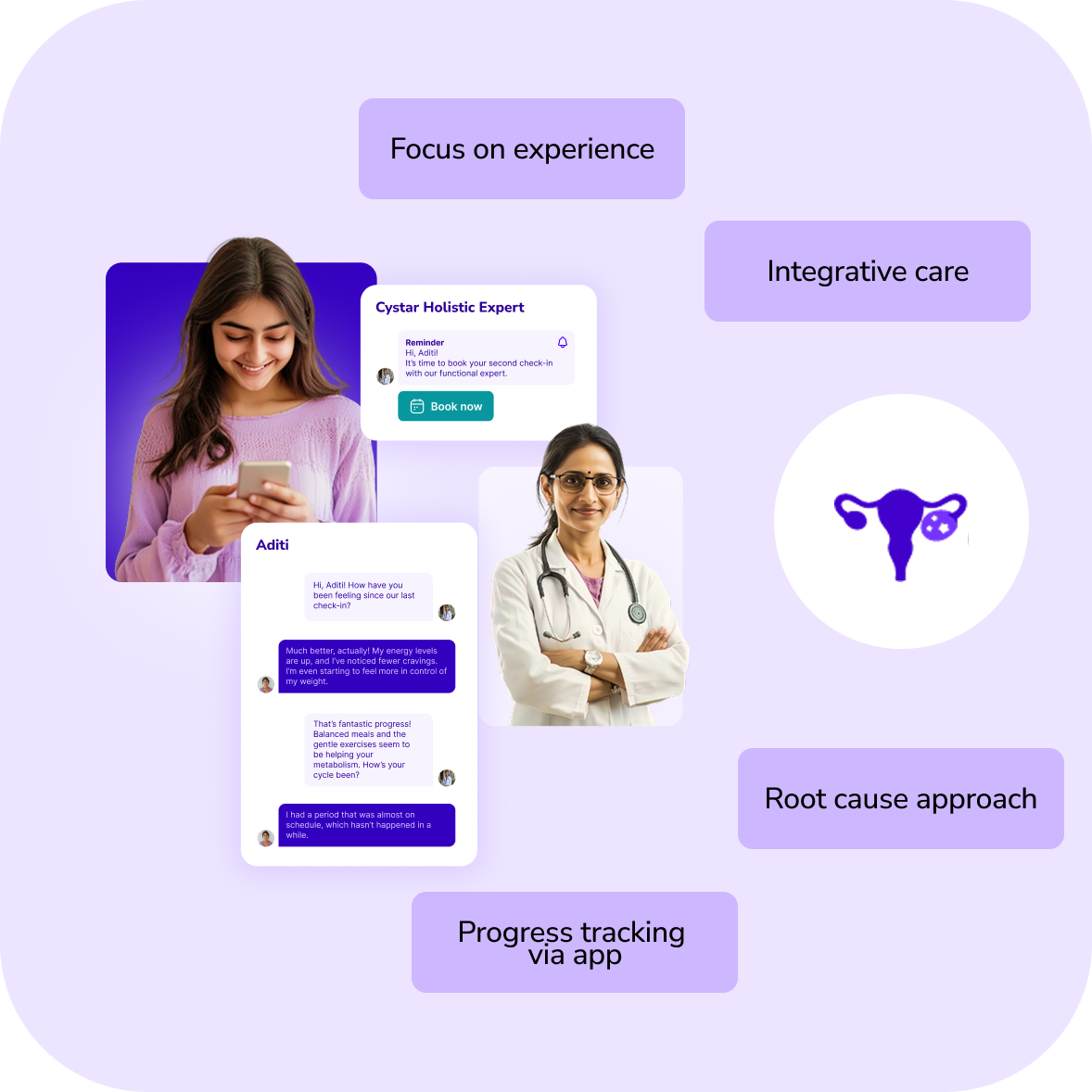Cystar Team
Table of Contents
Introduction
You may have googled “How do I know if I have PCOS?” or “What are the signs of PCOS?” a million times but you’re finally in the right place. Let’s break it all down in a way that makes sense.
Irregular periods, stubborn acne that won’t go away or unexplained weight gain make you wonder if something’s off. Maybe you’ve even seen a doctor but it still doesn’t make sense.
If that sounds like you, you’re not alone. PCOS (Polycystic Ovary Syndrome) is one of the most common hormonal disorders in women, affecting around 1 in 10 worldwide. But here’s the tricky part: it looks different for everyone. Some women struggle with facial hair, while others barely have any symptoms at all.
So, how do you actually know if you have PCOS?
Common PCOS Symptoms
PCOS is mainly a hormonal imbalance that affects your ovaries, metabolism, and even your skin and mood. It doesn’t have a specific set of symptoms that show up in all women but here are the most common signs of PCOS and how it affects your body:
1. Irregular or Missing Periods
This is one of the biggest symptoms of PCOS. If your periods come every few months, are super unpredictable or have stopped completely, PCOS might be the reason. This is because PCOS causes irregular ovulation, meaning your body doesn’t release an egg consistently, which messes with your cycle.
Most women dealing with PCOS have thick hair growing on their chin, upper lip, chest, or stomach.That’s because PCOS can cause high levels of androgens (male hormones), which leads to unwanted hair growth.
3. Hair Thinning or Hair Loss
Ironically, while some women with PCOS grow excess hair on their face and body, they may also experience hair thinning on the scalp. If your ponytail feels thinner or you’re noticing more hair in the shower drain, you might have PCOS.
4. Weight Gain
Many women with PCOS struggle with stubborn weight gain, particularly around their belly. Even with diet and exercise, losing weight can feel nearly impossible due to insulin resistance which triggers belly fat. So, you aren’t lazy in the gym, your body is just working against you right now but don’t be scared, you can lose weight with PCOS.
5.Acne & Oily Skin
Hormonal acne is a big PCOS symptom, especially deep, cystic pimples on the jawline, chin, and cheeks. If no skincare routine seems to work for you, your hormones might be to blame.
6. Fatigue & Low Energy
Another symptom of PCOS in women is fatigue. Women with PCOS are likely to have blood sugar crashes due to an insulin resistance in their bodies. Do you feel exhausted all the time, no matter how much you sleep? PCOS might be the reason.
6. Mood Swings, Anxiety, or Depression
PCOS isn’t just physical, it can affect your mental health too. Anxiety, mood swings and depression are symptoms you may suffer from if you have PCOS. This is because PCOS is caused by a hormonal imbalance.
What Causes PCOS?
Doctors and many experts don’t know the exact cause of PCOS, but have found a few key factors that play a role:
- Insulin Resistance: Most women with PCOS have insulin resistance, which means their body struggles to process sugar properly, leading to weight gain and hormone imbalances.
- Hormonal Imbalances: High androgen levels (male hormones) can cause excess hair growth, acne, and irregular periods.
- Genetics: It is likely for you to have PCOS if your mom, sister, or aunt has PCOS. Studies show that many genes contribute to the condition.
- Chronic Inflammation: PCOS is linked to low-grade inflammation which is common in women and can trigger hormonal imbalances and weight gain.
How to Know If You Have PCOS
If you suspect you have PCOS, here’s what you can do:
- Track Your Symptoms: Try to document your symptoms as much as possible. You can keep a journal of your periods, weight changes and other symptoms to discuss with a doctor.
- Get Blood Tests: If you suspect you have PCOS, getting a doctor to check your hormone levels, insulin, and glucose is a good place to start.
- Ultrasound Scan: Some women with PCOS have multiple small cysts on their ovaries (but not always). An ultrasound scan can reveal this and help in your diagnosis.
What to do if you have PCOS
While there is no “cure” for PCOS, it can be managed with the right lifestyle changes and support. At Cystar, we provide a comprehensive PCOS treatment program that includes lab testing, expert consultations, personalised meal plans, mental health support, and yoga sessions
This is what taking control of your PCOS looks like:
- Customized Nutrition Plans to help with insulin resistance
- Personalized Fitness Recommendations that actually work for PCOS
- Hormonal Balance Support with the right supplements and lifestyle changes
Join our PCOS program
You'll get support on 4 core areas of nutrition, supplementation, mental health and movement
Our programme takes a holistic approach, focusing on the whole person rather than isolated issues. It addresses various aspects to promote overall well-being and effectiveness.
Frequently Asked Questions
No, PCOS doesn’t just go away, but symptoms can be managed and improved with lifestyle changes like diet, exercise, and stress management.
Yes! Some women with PCOS still have regular cycles but struggle with other symptoms like acne, hair loss, or insulin resistance.
Diagnosis usually involves carrying out blood tests for hormone levels, an ultrasound to check ovaries, and reviewing your symptoms.







